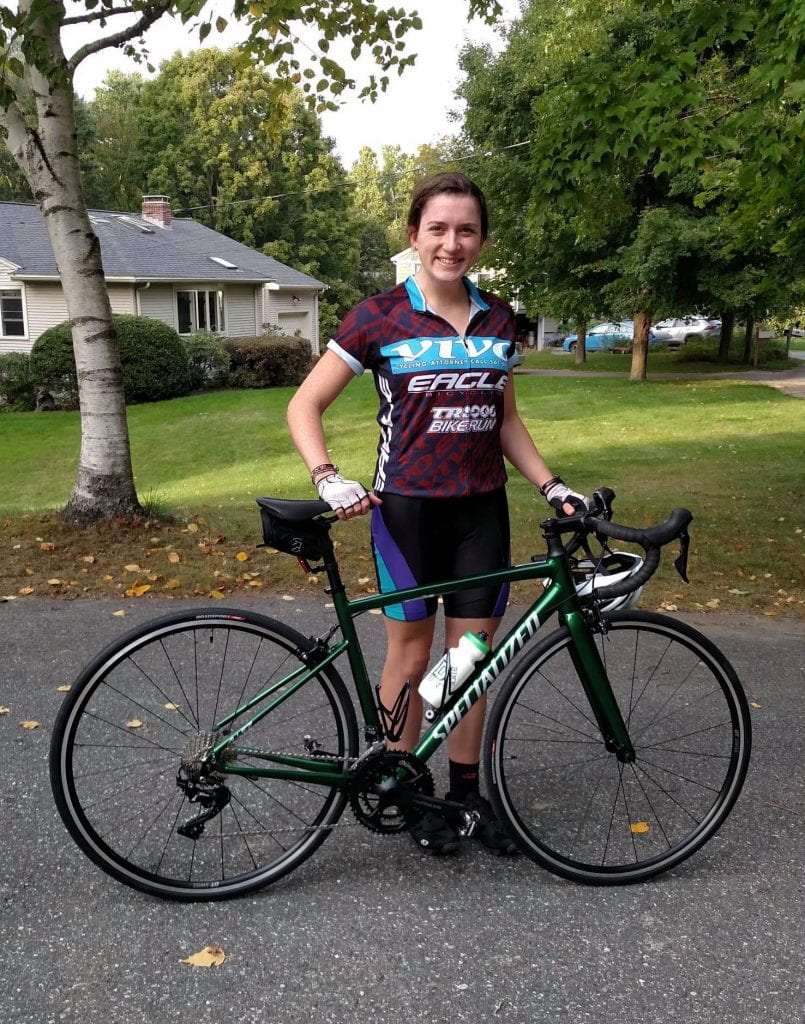Sika Henry, the very first African-American female triathlete with a pro card, spoke with the Dartmouth Triathlon Team in April. She shared her story of starting to do triathlons, her perspective on diversity in the sport, and a few lessons she’s learned about training.
Sika was an athlete in college, but not an endurance athlete; she was a walk-on high jumper at Tufts University. Her experience in endurance sports began several years after college, when she decided to start running and chose to run a marathon. Although she wasn’t a top finisher in her first event, she committed to training and tried again. She went on to win the Newport News marathon, not one time, but two years in a row. After a few years of distance running, she became interested in trying triathlon and began with a sprint-length race (0.5 mile swim, 12.4 mile bike, and 3.1 mile run). She found she enjoyed triathlon particularly for the variety in sports and the benefit of cross-training. As many of us on the Dartmouth Triathlon team have also discovered, practicing swimming improves a person’s running!
As Sika began competing in triathlons, she learned more about the notable lack of diversity in the sport. Often, she is the one of only a few African-American triathletes at a race, and she noted that African-American athletes make up only 0.5% of triathletes. When she started racing, there were no African-American female triathletes with a pro card, so Sika set her sights on earning a pro card as a way to inspire other athletes who can identify with her to pursue the sport. Receiving a pro card requires finishing in the top three at a qualifying race, and several times she finished just a few places after third. Sika hoped 2019 would be the year she achieved this, but she had a serious biking accident during a half-Ironman race in Texas which sent her to the hospital and required several weeks of recovery.
While she was recovering, she received cards from many people, including children, encouraging her in her recovery and showing her that she was a role model as an accomplished female African-American triathlete. Only a few months after the accident, Sika raced at the Ironman Championships in Kona, Hawaii. Despite being blown off her by bike strong winds, she completed the race. Sika said that hearing the words “Sika Henry, you are an Ironman,” made all her challenges worthwhile.
Although 2020 put a road block in the way of earning her pro card, she continued her training, and last month, shortly after speaking with the team, finished in the top three of the Cancun Challenge Triathlon to become the first African-American female triathlete with a pro card!
Sika often speaks about her experience to triathlon teams, to African-American audiences and to female audiences, as a way to share the sport with more people and increase its diversity. Within the Dartmouth team, we also notice a lack of diversity, and we are trying to improve this situation. Sika suggested a couple of good ways to start addressing this:
- Since people are much more likely to try triathlon and join the team if they are invited, she recommended that we make sure we are welcoming by specifically reaching out to people in groups at Dartmouth that are under-represented on the team.
- Because triathlon can be daunting, she suggested finding ways to make the sport less intimidating. Not everyone comes into the sport being comfortable with long races or with swimming, biking, and running. Providing opportunities for relays, duathlons, and pool-swim events can make triathlon seem more accessible to more people.
In addition to being a professional triathlete, Sika works full time. As busy Dartmouth students working hard to manage schoolwork and triathlon training, we found Sika’s balance inspiring. Sika had several suggestions for seeking balance:
- Find the time of day, either morning or afternoon, that works well in your schedule for workouts.
- Get ample sleep. Balancing work and training is tiring! Sika goes to bed early – often by 9pm – to make sure she has energy for her training and busy days.
- Eat a healthy diet and enough food to have energy for training. Cooking at home is the best way to have a lot of healthy meals.
- After long weekdays of work and training, find time to relax fully. Sika uses her weekends to train hard in the mornings and “relaxes hard” with friends in the afternoons.
- Listen to your body and recognize that sometimes taking time off from training is the best thing.
- If it’s hard to stay motivated, set a goal and work toward it. Sika picked an ultramarathon; she also suggested that something as simple as a 5k on the track can be a helpful goal.
- Find a personal “why” for training and build workouts around that to stay engaged.
- When training gets hard, having accountability partners to work out with or check in with maintains the community aspect of training.
For the Dartmouth team, which has had a year without competitions and with reduced team connection, listening to Sika offered some much-appreciated motivation, regarding both diversity and training. We look forward to implementing her suggestions in the coming months as Dartmouth practices and competition resume.
Sika, thank you for speaking with us, and congratulations on your pro card! You are an inspiration to the Dartmouth Triathlon Team!
About the Author
Sarah Hutchinson is a ’22 from Concord, Massachusetts, majoring in Engineering and minoring in French and Human-Centered Design. She debuted her endurance athlete career at age 8 by running the 4th of July mile race in her hometown. She competed as a runner in high school, while dabbling in swimming and biking. Sarah started on the Tri Team during her first fall at Dartmouth and has never looked back. Outside of triathlon, Sarah enjoys hiking, adventuring in general, cooking, and doing anything related to water.
